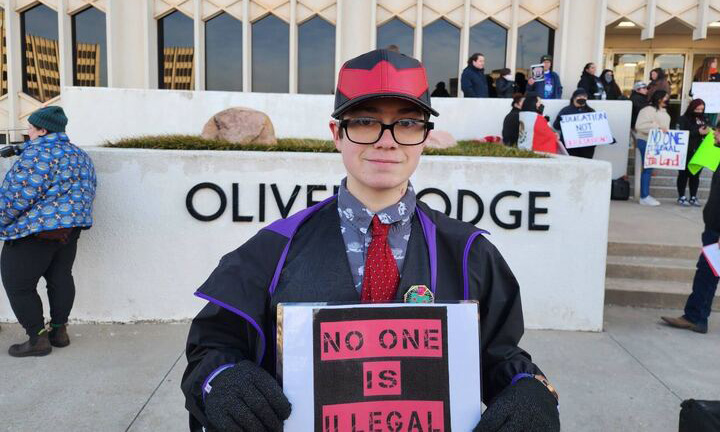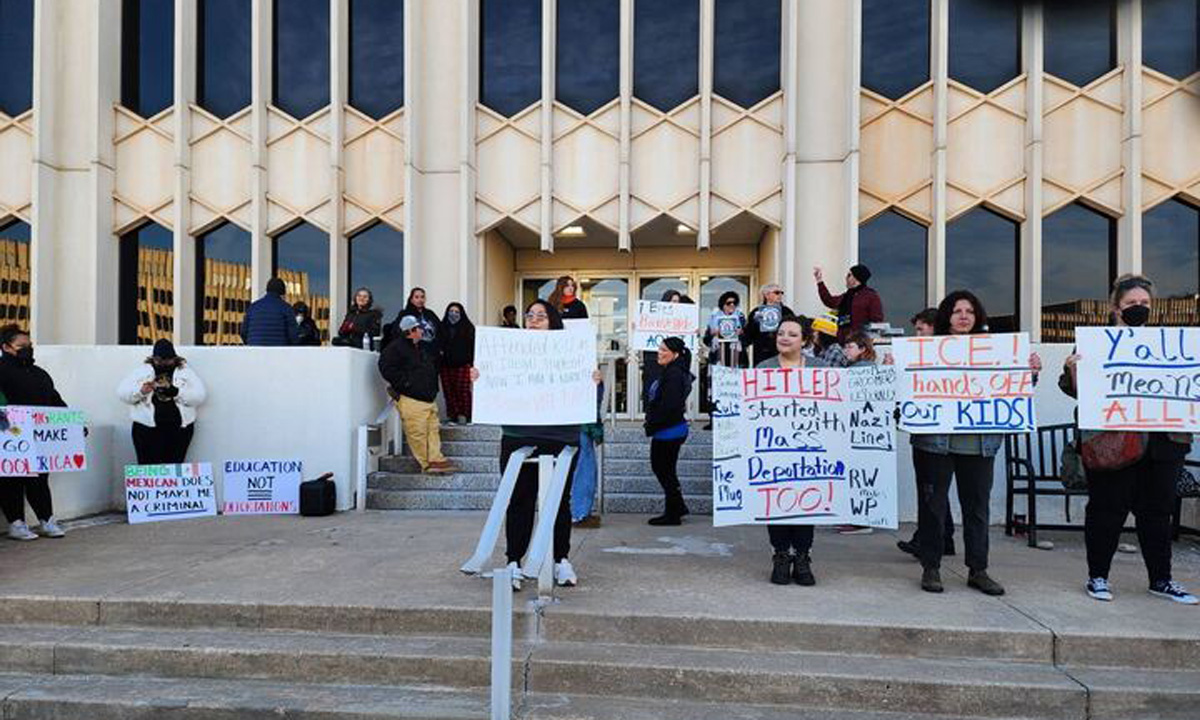From strategic defiance to more open compliance, school districts across the country are gearing up in very different ways for how to respond if — or when — immigration agents arrive on campus.
Their deliberations are occurring as Immigration and Custom Enforcement raids have begun across the country and as President Donald J. Trump’s new administration removed a long-standing protection placing schools, hospitals and churches off-limits to such enforcement actions.
Sonja H. Trainor, executive director of the National School Attorneys Association, told The 74 on Monday that her members are already reporting a significant decrease in student attendance — and tremendous concern among parents about Trump’s latest orders.
And while many education leaders have pledged to keep ICE at bay — Georgia’s Gwinnett County Public Schools instructed staff to make a copy of agents’ identification cards and to “not offer any information” — others are advising greater degrees of cooperation. One extreme outlier: Oklahoma’s Republican state Superintendent Ryan Walters, who said he welcomes raids targeting children.
“Schools haven’t been working with law enforcement on this,” he said. “However President Trump decides to carry out the actions around his immigration policy, we are going to absolutely work with him on that.”
Trainor said her organization will be offering districts specific counsel on how to respond to ICE, including a webinar presented by an immigration attorney, in the coming weeks.
Most school protocols for visits from law enforcement agencies, including immigration agents, she said, call for a school official to greet the officer; ask for credentials and any order, subpoena, or warrant; and to get a specific administrator to interact with them.
“The administrator may also want to consult legal counsel based on the circumstances,” she said. “Each scenario may be fact specific and require schools to be neutral and objective looking at state/federal law for release of student information.”
The United States is home to some 850,000 undocumented children and as of 2018, roughly 6 million people under the age of 18 lived with at least one family member, often a parent, who was undocumented, according to the American Immigration Council.
Tom Homan, Trump’s border czar, told ABC’s “This Week” that he’s willing to execute raids in K-12 schools, saying it will help solve another problem: crime.
“How many MS-13 members are the age 14 to 17? Many of them,” Homan said Sunday, referring to a notoriously violent street gang with roots in Central America.
Longtime Oklahoma science teacher Jenny Bobo said students and families in her school community are filled with dread.
“People are terrified,” she told The 74. “We, as educators, fear for our students. We are terrified that, in order to advance political careers, entire buildings full of children will be traumatized.”
Small-scale protests in Oklahoma have already begun, as students and adults plead to keep families together.

Bobo’s 14-year-old son, Preston Lee Bobo, was among a group of protestors who attended the state Board of Education meeting Tuesday morning in Oklahoma City. The board voted to approve Walters’ proposal requiring that families provide information on their immigration or citizenship status when enrolling their kids. The move is seen as possibly violating Plyler v. Doe, the landmark 1982 Supreme Court ruling that a child cannot be denied a public education based on immigration status, and could potentially create a trove of data making undocumented students in Oklahoma more vulnerable to ICE enforcement.
Preston said he wanted to call attention to what he believes is unfair treatment of undocumented children. The teen was not permitted to speak as the public comments portion of these events has been greatly curtailed: Walters and the board have been accused of violating open meetings laws. If given the chance, Preston said he was ready to be heard.
“I think that they should be treated like any other student,” the teen said of his undocumented peers. “Agents coming in and looking for undocumented children is inappropriate. If they find them, then they will presumably try to get them deported and I don’t support that. I also don’t really want a bunch of cops in my school. We already have SROs (school resource officers).”
John Seidlitz, a long-time educator, immigrant advocate and founder of the California-based Seidlitz Education, said he’s concerned about the stress raids could place on children.
“As educators, we have spent years learning about the effects of trauma on educational outcomes,” he said. “The threat of ICE presence in schools will have a serious negative impact not only on undocumented students, but on all students attending public schools.”
Rumors about ICE agents on or near school grounds continue to spread through social media. But it’s unclear whether immigration agents will actually come to campus. Some school officials have been told their districts are not targets.
Christopher Cram, a spokesperson for Maryland’s Montgomery County Public Schools, said the school system was led to believe through a virtual call on Friday with immigration officials that campuses are still safe.
“Despite the Department of Homeland Security’s recent statement that ICE agents no longer have to ‘honor’ the ‘sensitive locations’ guidance, recent comments by ICE officials to Maryland superintendents indicate that there are no plans to visit or take action near schools,” he said.
But the atmosphere remains tense. The Chicago Public Schools reported last week that ICE agents visited one of its campuses only to later realize this was untrue: It was the Secret Service on an unrelated matter. But immigration raids were conducted elsewhere in the city within the past few days and also in New Jersey among a host of other early locations, including the Denver area and Atlanta.
Some indigenous people in Arizona and New Mexico were caught up in the sweeps. Citing a senior Trump official, NBC News reported Tuesday that immigration authorities made close to 1,200 arrests in just one day, roughly 245 more than initially claimed. Nearly half of those detained don’t have criminal records, it reported, which Trump had said would be ICE’s primary focus.
In an effort to prepare for any outcome, state and local education agencies have provided school personnel — and, in some cases, parents — varying directives. Many reflect the fine line between protecting students’ rights and violating federal law.
- The state superintendent of schools in Maryland said in a memo that “school personnel should not argue or debate with immigration enforcement officials but should direct them to the local superintendent or designated administrator for further action.”
- Charlotte-Mecklenburg Schools in North Carolina said its administrators must, when told by agents they want to speak to a particular child, attempt to contact their parents and remain with the student during a law enforcement interview. The directive said they “should not interfere with any ICE enforcement action, which may include service or execution of warrants, interviews, searches, or arrests,” but that students have a right against self-incrimination and may not be required to provide information that would establish residency status.
- Gwinnett County Public Schools in Georgia provided staff with a script, advising them to welcome the agents and say, “We will cooperate within the boundaries of the law, but to ensure minimal disruption, please have a seat until the principal arrives.” They’re further instructed to make copies of any warrants, not allow agents access beyond the vestibule until their identity is confirmed and to document the agent’s name, badge number, agency affiliation, time, date, and details of the request.
- The School District of Philadelphia asked parents Friday to make sure that all emergency contact information is updated for their children.
- Chicago Public Schools CEO Pedro Martinez pledged, in English and Spanish, to support immigrant students and their families, saying at a press conference last week: “Regardless of this policy change, our protocols will remain in place. There is complete alignment here between our state, our city and our district … CPS does not ask for a family’s immigration status. CPS will not coordinate with Immigration and Customs Enforcement or ICE. CPS does not share student records with ICE except in the rare case where there’s a court order or consent from a parent or guardian.”
- Orange County Public Schools in Florida was advised by one of its attorneys to contact students’ parents whenever possible to ask for their permission for an ICE agent to interview their child. But, it notes, that if an administrator informs the parent of an interview after being told not to by law enforcement, refuses to leave the room when directed or interferes with a student’s arrest, they “may be subject to arrest on charges of tampering with a law enforcement investigation or obstructing a law enforcement official.”
- Clark County School District in Las Vegas told staff that if there is a concern with the identity of the officer or agent — or the reason for their visit — they should call the Clark County School District Police Department.
